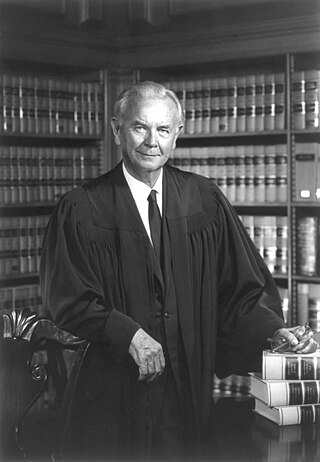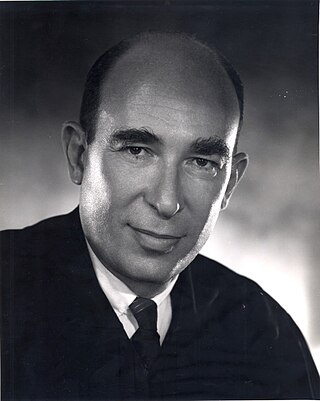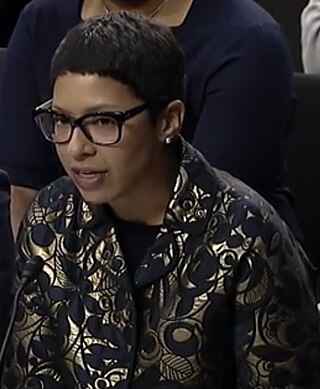The University of Pennsylvania Carey Law School is the law school of the University of Pennsylvania,a private Ivy League research university in Philadelphia,Pennsylvania. Penn Carey Law offers the degrees of Juris Doctor (J.D.),Master of Laws (LL.M.),Master of Comparative Laws (LL.C.M.),Master in Law (M.L.),and Doctor of the Science of Law (S.J.D.).

Richard Allen Epstein is an American legal scholar known for his writings on torts,contracts,property rights,law and economics,classical liberalism,and libertarianism. He is the Laurence A. Tisch Professor of Law at New York University and the director of the Classical Liberal Institute. He also serves as the Peter and Kirsten Bedford Senior Fellow at the Hoover Institution and as a senior lecturer and the James Parker Hall Distinguished Service Professor of Law Emeritus at the University of Chicago.

William Joseph Brennan Jr. was an American lawyer and jurist who served as an Associate Justice of the Supreme Court of the United States from 1956 to 1990. He was the seventh-longest serving justice in Supreme Court history,and was known for being a leader of the Court's liberal wing.
Michael William McConnell is an American jurist who served as a United States circuit judge of the United States Court of Appeals for the Tenth Circuit from 2002 to 2009. Since 2009,McConnell has been a professor and Director of the Stanford Constitutional Law Center at Stanford Law School. He is also a senior fellow at Stanford University's Hoover Institution,and Senior Of Counsel to the Litigation Practice Group at Wilson Sonsini Goodrich &Rosati. In May 2020,Facebook appointed him to its content oversight board. In 2020,McConnell published The President Who Would Not Be King:Executive Power under the Constitution under Princeton University Press.

Diane Pamela Wood is an American attorney who serves as the director of the American Law Institute and a senior lecturer at the University of Chicago Law School. She previously served as a circuit judge on the United States Court of Appeals for the Seventh Circuit.

Burt Neuborne is the Norman Dorsen Professor of Civil Liberties at New York University School of Law and the founding legal director of the Brennan Center for Justice.
Paul Finkelman is an American legal historian. He is the author or editor of more than 50 books on American legal and constitutional history,slavery,general American history and baseball. In addition,he has authored more than 200 scholarly articles on these and many other subjects. From 2017 - 2022,Finkelman served as the President and Chancellor of Gratz College,Melrose Park,Pennsylvania.

David D. Cole is the National Legal Director of the American Civil Liberties Union (ACLU). Before joining the ACLU in July 2016,Cole was the Hon. George J. Mitchell Professor in Law and Public Policy at the Georgetown University Law Center from March 2014 through December 2016. He has published in various legal fields including constitutional law,national security,criminal justice,civil rights,and law and literature. Cole has litigated several significant First Amendment cases in the Supreme Court of the United States,as well a number of influential cases concerning civil rights and national security. He is also a legal correspondent to several mainstream media outlets and publications.
Geoffrey R. Stone is an American legal scholar and noted First Amendment scholar. He is currently the Edward H. Levi Distinguished Service Professor of Law at the University of Chicago Law School,where he served as the dean from 1987 to 1994,then provost of the University of Chicago from 1994 to 2002.

The Brennan Center for Justice at New York University School of Law is a liberal or progressive nonprofit law and public policy institute. The organization is named after Supreme Court Justice William J. Brennan Jr. The Brennan Center advocates for public policy positions including raising the minimum wage,opposing voter ID laws,and calling for public funding of elections. The organization opposed the U.S. Supreme Court's ruling in Citizens United v. FEC,which held that the First Amendment prohibits the government from restricting independent political expenditures by nonprofits.

Jeffrey Rosen is an American legal scholar who serves as the president and CEO of the National Constitution Center,in Philadelphia.

William Hubbs Rehnquist was an American attorney and jurist who served as the 16th chief justice of the United States from 1986 until his death in 2005,having previously been an associate justice from 1972 to 1986. Considered a staunch conservative,Rehnquist favored a conception of federalism that emphasized the Tenth Amendment's reservation of powers to the states. Under this view of federalism,the Court,for the first time since the 1930s,struck down an act of Congress as exceeding its power under the Commerce Clause.

Wilfred Feinberg was a United States circuit judge of the United States Court of Appeals for the Second Circuit and previously was a United States District Judge of the United States District Court for the Southern District of New York.

Gerard Edmund Lynch is an American lawyer who serves as a senior United States circuit judge of the United States Court of Appeals for the Second Circuit. He was confirmed to that seat on September 17,2009,after previously having been appointed in 2000 by President Bill Clinton to serve on the United States District Court for the Southern District of New York. Judge Lynch was the first appeals-court judge nominated by President Barack Obama to win confirmation from the United States Senate.

Adam Winkler is the Connell Professor of Law at the UCLA School of Law. He is the author of We the Corporations:How American Businesses Won Their Civil Rights and Gunfight:The Battle over the Right to Bear Arms in America. His work has frequently been cited in judicial opinions,including in Supreme Court cases pertaining to the First and Second Amendments.
The Marshall-Brennan Constitutional Literacy Project is civic education program in which law students work with local high schools to enhance understanding of constitutional law and oral advocacy. The project was founded in 1999 at American University's Washington College of Law in Washington,D.C.,by Professor Jamie Raskin. There are now nearly 20 chapters in the United States,and there are 2 international chapters. The program began as a way of addressing civic disengagement and a lack of political participation. Through analyzing Supreme Court decisions and participating in moot court arguments,participating high school students learn about their rights as citizens,the strategic benefits of voting,how lawmaking occurs,and other fundamental constitutional processes. They also have the opportunity to compete in a national moot court competition.

In the United States,a person may have their voting rights suspended or withdrawn due to the conviction of a criminal offense. The actual class of crimes that results in disenfranchisement vary between jurisdictions,but most commonly classed as felonies,or may be based on a certain period of incarceration or other penalty. In some jurisdictions disfranchisement is permanent,while in others suffrage is restored after a person has served a sentence,or completed parole or probation. Felony disenfranchisement is one among the collateral consequences of criminal conviction and the loss of rights due to conviction for criminal offense. In 2016,6.1 million individuals were disenfranchised on account of a conviction,2.47% of voting-age citizens. As of October 2020,it was estimated that 5.1 million voting-age US citizens were disenfranchised for the 2020 presidential election on account of a felony conviction,1 in 44 citizens. As suffrage rights are generally bestowed by state law,state felony disenfranchisement laws also apply to elections to federal offices.
Justin Levitt is an American constitutional law scholar and professor at Loyola Law School. In September 2015,he left Loyola Law School to become the Deputy Assistant Attorney General in the United States Department of Justice Civil Rights Division. He returned to the faculty of Loyola in early 2017. He then returned to government from 2021-2022,serving as the first Senior Policy Advisor for Democracy and Voting Rights under the Biden Administration before returning once again to the Loyola faculty.

Melissa Erica Murray is an academic and legal scholar who is the Frederick I. and Grace Stokes Professor of Law at NYU Law,where she has been a member of the faculty since July 1,2018. Murray was previously the interim dean of the UC Berkeley School of Law.
Stephen J. Wermiel is an American legal scholar,historian,and professor of law at American University Washington College of Law specializing in First Amendment law and the history of the United States Supreme Court. Wermiel has written several biographical books about Supreme Court Justice William J. Brennan,Jr. Alongside Jamie Raskin,Wermiel co-founded the Marshall-Brennan Constitutional Literacy Project.












